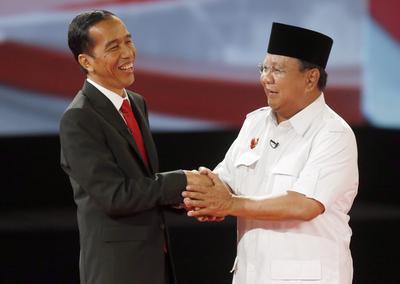This shift towards Prabowo follows many months of largely uncritical adulation of the former Jakarta and Surakarta mayor, PDI-P candidate Joko ‘Jokowi’ Widodo, as a certainty for office. But the prevailing wisdom now sees the election as a tight race.
This increased sense of competition for the presidency was enhanced when the chairman of Indonesia’s largest political party, Golkar, billionaire businessman Aburizal Bakrie, recently shifted allegiance from Jokowi to Prabowo.
Some observers have suggested that, as the largest party, Golkar’s official backing for Prabowo will turn out its voters as a block. Prabowo’s coalition of backers, including Golkar, controls just over half of Indonesia’s legislature, compared with Jokowi’s lesser 37 per cent.
Having noted this, since the return of multiparty democracy in 1999, legislative elections have only once been an indicator of presidential outcomes, and that was in 2009 on the back of the pre-existing popular presidency of Susilo Bambang Yudhoyono. Further, Bakrie became Golkar chairman through elite wheeling and dealing, not because he is loved by its membership.
Many in Golkar would prefer to see Jokowi’s running mate, Jusuf Kalla, still at the party’s helm. This means that the Golkar vote is likely to be divided, diminishing the value of Bakrie’s support for Prabowo.
Smaller Islamic parties have also lined up behind Prabowo, strengthening his position at the margins. Yet with many devout Muslims also concerned about corruption and justice, even here Jokowi’s anti-corruption claims could give him an edge over Prabowo, who is the former son-in-law of the vastly corrupt President Suharto.
One factor in Jokowi’s relative decline in popularity has been that Indonesia’s media, owned by a small group of businessmen sympathetic or linked to Bakrie, have also come out strongly in favour of Prabowo. Prabowo has dominated the media airwaves and only slightly less so the print media. By contrast, Jokowi has had more limited recent exposure and even been actively blocked by some media outlets.
Despite these disadvantages, Jokowi remains so far ahead in public opinion polls that a high number of undecided voters would have to break overwhelmingly in favour of Prabowo for Jokowi to lose.
Just over half of respondents to one recent major survey said they would vote for Jokowi and his running mate, Jusuf Kalla. Slightly less than a third said they would vote for Prabowo and his running mate, former Yudhoyono economics minister, Hatta Rajasa. Other polls have shown similar results.
On that basis, despite a shift towards Prabowo, largely exaggerated by the media, Jokowi is still likely to be Indonesia’s next president.
While policy matters — or it should — there is little of substance between Jokowi and Prabowo. But Indonesian presidential elections have always been more about (perceived) personality than policy substance. Jokowi is seen to be a ‘man of the people’; Prabowo is a self-styled strong-man. Both styles have their supporters, but Jokowi’s has fewer negative associations with the past.
Prabowo has been busy denying allegations of past human rights abuses, notably those of the kidnap, torture and disappearance of protesters just prior to Suharto’s political demise. Prabowo was ousted from the army because of the claims. Luckily for him, his much darker past, in both East Timor and West Papua, raises little interest in the rest of Indonesia.
No doubt the next few weeks before the 9 July election will see a heightening of Indonesia’s political competition between candidates who have consolidated Indonesian politics around two poles. It might even be possible to discern, between them, a more progressive and a more conservative orientation, giving the race a more conventional democratic hue.
Seeing Indonesian politics in such conventional progressive-conservative terms reflects a Westernised political mindset. And it may be that if Prabowo is successful, Indonesia will move in a less clearly democratic direction.
But Prabowo’s victory still seems unlikely. Indonesia will perhaps not get a great president with Jokowi, who will have to confront a fractious and oppositional legislature. But the likely outcome of Indonesia’s presidential elections will have taken Indonesia a significant step along the path to ‘democratic consolidation’ — in peculiarly Indonesian terms.
Professor Damien Kingsbury is Director of the Centre for Citizenship, Development and Human Rights at Deakin University.


Prof Kingsbury says nothing new here. It’s well-established that, in Indonesia, legislative votes don’t translate into ballot-box performance at executive elections. And it’s already possible to “discern… a more progressive and a more conservative orientation” between the two candidates (Prabowo is clearly the more conservative). This is at best a weak rehash of arguments already put forward by other scholars, both here and at New Mandala.